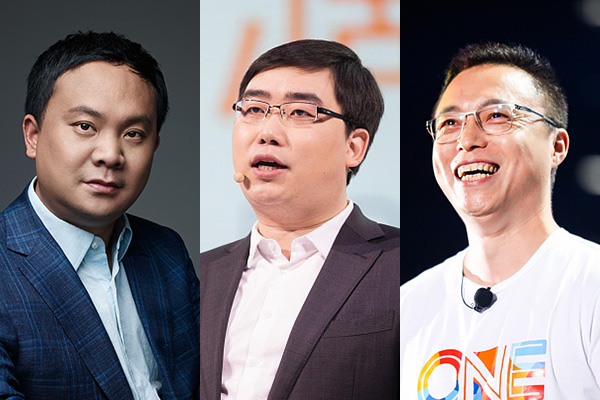Innovation heralds a new online era
 |
|
From left: Han Kun, CEO and founder of Yixia Tech, Cheng Wei, CEO and founder of Didi Chuxing, and Eric Jing, CEO of Ant Financial Services Group. [Photo/VCG] |
Editor's Note: The fourth World Internet Conference, also known as the Wuzhen Summit, starts on Sunday in Wuzhen, Zhejiang province. In the run-up to the event, China Daily reporters Ma Si, He Wei and Fan Feifei quizzed senior executives from three internet-based businesses that are at the forefront of online innovation. Here, Cheng Wei, CEO and founder of ride-sharing firm Didi Chuxing, Han Kun, CEO and founder of video-sharing app Yixia Tech, and Eric Jing, CEO of Ant Financial Services Group, an affiliate of Alibaba Group Holding Ltd, discuss how the internet is reshaping innovation.
How do you view China's role in the global internet arena, and what are the most innovative trends and products?
Cheng Wei: In recent years, I've seen so many innovations in China's internet industry. And it has made a huge difference across the world. I believe China will become the online linchpin, leading a number of revolutionary transformations in the sharing economy, transportation and artificial intelligence.
The most interesting development is how people take things online and then apply them offline again to change existing industries. The artificial intelligence technology behind ride-sharing is now being used to help taxi companies and bus operators to revolutionize the way they manage drivers, and vehicles.
Traffic lights have existed for centuries but now Didi scientists are using big data analytics to manage them real time. Technology is not only about expensive gadgets but a life necessity such as affordable, on-demand mobility for everyone.
The ability of technology is to bridge gaps and be a force of inclusion rather than exclusion. This is the trend that will carry China and the rest of the world toward a more interconnected and shared future.
Han Kun: China's internet technology and applications have evolved alongside the rapid development of the country's economy. Our mobile internet technology and apps are currently leading the world. We are also innovators in the internet field.
The most innovative products may come from the areas of artificial intelligence, or AI, and mobile video. As AI technology sweeps across the world, countries are introducing new laws and policies to secure the development of this industry. Additionally, mobile videos, especially short ones, have experienced high speed development.
Eric Jing: The so-called "Copy to China" model has seen a distinct shift in recent years. In fact, in sectors like fintech, China has the scale and technology to lead innovation globally.
The prevalence of mobile payments has unlocked new economic opportunities for people and small businesses. Nowadays, four Chinese consumers in five will tell you that they are comfortable going out with only their smartphones and no cash.
People, including the elderly, buy groceries from street vendors by scanning a printed QR code using their mobile phones. You just don't see this in other parts of the world. In addition to bringing convenience for buyers, mobile payment has also helped street vendors address the long standing issue of fake bank notes. Another area that China is well positioned to compete globally is the application of AI to transform traditional businesses. The tangible benefit of applying AI to services has the power of dramatically increasing productivity. This in turn will give people greater access.
What will be the challenges facing China as it becomes a powerful, friendly internet country?
Cheng Wei: Powerful internet countries have many similar traits, but I think the most important ones are being inclusive and forward-looking. Didi's rapid growth in China proves how important these characteristics can be.
For example, when the rest of the world was bickering about whether online ride-hailing and ride-sharing was legal or not, China became the first country to give it the all clear on a national basis. It was a huge step for a country with the vision to see the coming revolution in transport.
With ride-sharing, electric vehicles and autonomous driving, China will lead the next wave in transportation across the world.
Han Kun: As far as I am concerned, internet power should have the following characteristics, such as a large population and a well-equipped network infrastructure. It should also be strong scientifically with innovation capability and a pool of internet talent. A good capital environment is another important part. China has nearly all those characteristics.
But the country still needs to grasp the coming opportunities, meet the needs of consumers and sustain innovation.
Eric Jing: A country with a strong internet sector needs many ingredients. China luckily has most of them, such as good internet infrastructure and a vast talent pool for the sector. It also has a large savvy population and a high mobile internet penetration rate, as well as supportive government policies.
When you have all of those ingredients, it is only natural to see cities such as Beijing, Shanghai, Shenzhen and Hangzhou become talent magnets globally. The challenge is how you make the overall environment even more attractive to innovation. We need more collaboration between academia and industry to accelerate the process from research and development to application of new technologies. That will be the key to success.
Do you believe China's experiences, or practices, related to technology and the internet can be used to solve global problems?
Cheng Wei: Yes, of course. China is the world's largest and probably the most complex internet market. Tech companies can gain rich insight and develop advanced technological capabilities here, which will help them go further.
Take Didi as an example. The intensity of traffic congestions and mobility inefficiency in China is unparalleled. The services we have developed to deal with these problems can be used elsewhere. We have managed to introduce quite a few services, which we have created for China's market, to the wider international communities.
Our minibus and hitch programs have been adopted respectively by our partners in Brazil and Southeast Asia, where they can perfectly meet local demands.
Han Kun: Yes, of course. One of the most important experiences gained from China's sustained internet development has been innovation. Whether it is the portal era, the e-commerce era or the era of the shared economy, innovation has always been a driving force for development.
Eric Jing: Definitely. A large percentage of people are underserved in terms of financial services, especially in developing markets. Digital payment systems can greatly reduce the cost of serving customers, especially with basic financial services, such as savings accounts, and even wealth management.
Ant Financial's technology capability and experience in providing digital financial services in China have stood the test of time and scale. For example, we processed 256,000 transactions per second during the peak of the Singles Day shopping festival. By working with our global partners, we are confident that the same technological capability can be leveraged in other parts of the world to make financial services more inclusive. It will give people equal opportunities.
In the past year, what changes in the internet and technology sectors have impressed you, and will they make an impact in the future?
Cheng Wei: One of the greatest revolutions is the integration of the three internets. That is the internet of information, the internet of energy, and the internet of transportation. This revolution is not only the result of technological advancement, but an inevitable choice to change a centuries old unsustainable model of development. Integration will change this.
Cars will not be owned but shared. Energy produced in an eco-friendly way will be connected to a web of charging stations. Transportation will be arranged and deployed on big data-powered platforms. Parking lots will make way for schools and green spaces.
The entire landscape of cities will be changed for the better.
Han Kun: During the past few years, China's internet industry has gone through many changes and innovations. These include online to offline, or O2O, the shared economy, mobile live broadcasts and short video. Changes will affect our future since all of them are based on meeting people's needs.
Eric Jing: Mobile payments moving into more offline areas and covering more geographical regions became an important change this year. The trend will dramatically change our lives and the real economy. We are already seeing rapid growth in the shared economy sector, such as bikes and home stay. And mobile payments are helping this industry grow.
How will artificial intelligence improve your business and how will you tap into the technology?
Cheng Wei: Didi caters for 25 million rides a day. Every single one is arranged, deployed and completed by the power of AI. Didi is fully committed to big data, machine learning and artificial intelligence, which can continuously improve the efficiency of our platform.
Every day, we process 20 billion routing requests and deal with 15 billion location points. Didi's AI capabilities are based on the enormous amount of data. By analyzing the behavior and locations of our users - both the drivers and the passengers - we are getting better at deploying capacities.
Han Kun: Artificial intelligence is affecting all industries and Yixia is no exception. We have already been applying this technology on our Miaopai and Yizhibo platforms.
In October, we cooperated with SenseTime and Star VC in exploring video advertisements using artificial intelligence and augmented reality in our content. The technology will also be applied to our Miaopai and Yizhibo platforms.
Eric Jing: AI is one of the pillars of our BASIC strategy - namely Blockchain, AI, Security, Internet of Things and Cloud Computing. The technology has tremendous potential to increase productivity, which is something we must continue to improve, so people can access more products and service.
Our AI capabilities include voice recognition, natural language processing and image recognition. We are already applying and constantly exploring new ways to use this technology in our products and services. For example, our AI powered real-time risk management platform, AlphaRisk, reduces fraud on Alipay with a loss rate of one in 1 million.
Another example of an AI application is the intelligent assistant within our Alipay app. It is able to handle interactions with a user by answering questions like a human being.
In the next five years, what will be the new internet and technology trends?
Cheng Wei: The integration of three internets, namely the internet of information, the internet of energy and the internet of transportation, will transform the landscape of cities.
Han Kun: Short video is hot within the internet industry and this trend will continue. With the development of the mobile internet, traditional image-text methods will give way to vivid, short videos. This is because video meets the needs of consumers looking for information.
The trend also gives us an advantage as Miaopai is now one of China's most successful short video platforms. According to the latest data from QuestMobile, the leading big data service provider, our monthly user scale has exceeded 310 million for two consecutive months.
Eric Jing: Technologies, such as the internet of things, blockchain and biometrics, are going to expand quickly with wide application. Blockchain allows an online ledger to be open to public scrutiny, creating a level of trust that was not there before.
We are already piloting the application of blockchain in areas such as philanthropy and mutual insurance, so as to foster more trust-based growth.

























